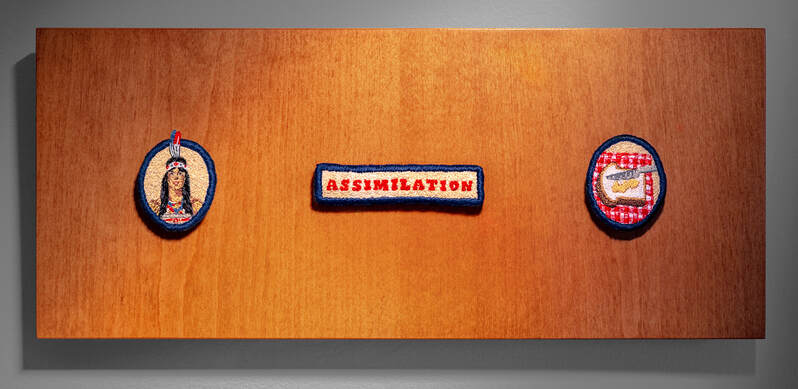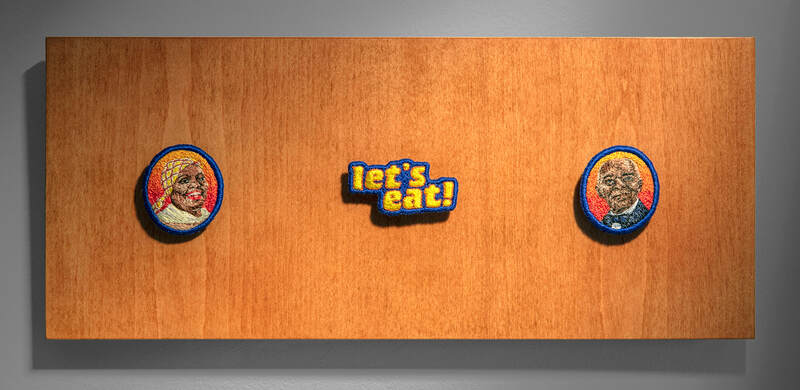Assimilation
In 1928, American advertising illustrator Arthur C. Hanson drew the original Native American maiden "Mia" for the Land O'Lakes packaging. The original design of Mia was created to evoke a connection with the Thanksgiving holiday season. The hope was that by associating specific foods and brands with Native Americans, consumers would be more apt to purchase these products during the holidays.
Updated in the 1950's by Native American artist Patrick DesJarlait, the character of Mia became more closely associated with Henry Wadsworth Longfellow's Native American woman, Minnehaha. But still today, this, and many other Native images are appropriated for the benefit of American industry and entertainment. Go ahead, spread more of that butter on your white bread.
New Embroidery on cotton/canvas
(Woodwork - Tom Fink)
In 1928, American advertising illustrator Arthur C. Hanson drew the original Native American maiden "Mia" for the Land O'Lakes packaging. The original design of Mia was created to evoke a connection with the Thanksgiving holiday season. The hope was that by associating specific foods and brands with Native Americans, consumers would be more apt to purchase these products during the holidays.
Updated in the 1950's by Native American artist Patrick DesJarlait, the character of Mia became more closely associated with Henry Wadsworth Longfellow's Native American woman, Minnehaha. But still today, this, and many other Native images are appropriated for the benefit of American industry and entertainment. Go ahead, spread more of that butter on your white bread.
New Embroidery on cotton/canvas
(Woodwork - Tom Fink)
Let's Eat
Aunt Jemima and Uncle Ben were familiar characters when I grew up. American corporate inventions, this "food" was a modern convenience in the 1950's and 60's. Did we ever think to connect these characters with the dark history they represented? No, we did not.
In the spring of 2020, when this work was originally completed, Uncle Ben still existed in this very same depiction, and Aunt Jemima had been updated to reflect a young, more modern black woman - but still carried the original name. In the wake of the protests over the police murder of George Floyd, the makers of Aunt Jemima and Uncle Ben have announced that in 2020 they are changing the name and image of these long-time product icons.
New Embroidery on cotton/canvas
(Woodwork - Tom Fink)
Aunt Jemima and Uncle Ben were familiar characters when I grew up. American corporate inventions, this "food" was a modern convenience in the 1950's and 60's. Did we ever think to connect these characters with the dark history they represented? No, we did not.
In the spring of 2020, when this work was originally completed, Uncle Ben still existed in this very same depiction, and Aunt Jemima had been updated to reflect a young, more modern black woman - but still carried the original name. In the wake of the protests over the police murder of George Floyd, the makers of Aunt Jemima and Uncle Ben have announced that in 2020 they are changing the name and image of these long-time product icons.
New Embroidery on cotton/canvas
(Woodwork - Tom Fink)


